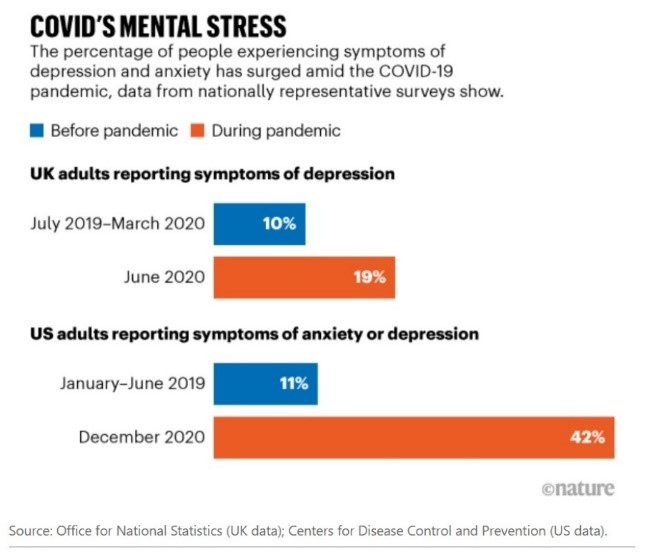Companies have a vested interest in protecting employees’ mental health and ignoring it can have moral, legal, reputational and economic consequences.
Disruption caused by the pandemic has highlighted and exacerbated mental health issues among employees. Creating or reassessing an existing strategy to support employees is now more essential than ever:
People are typically the number one asset and the biggest risk so looking after them is crucial
Getting the strategy right will drive better engagement and productivity – leading to a reduction in absence and better performance.
Getting this wrong could lead to legal issues as well as adverse economic outcomes for the business.
It is therefore of vital importance to have a practical and proactive strategy in the workplace.
Developing and adjusting such a strategy should be a team effort between the C-suite, senior managers, line managers, HR/people team, mental health service providers, risk managers, legal advisors and employee benefit advisers. Some of the best companies I’ve observed have one or more senior manager who have opened up and discussed their own mental health challenges and how they overcame them. This helps break down the stigma and barriers: Poor mental health does not affect a specific type of employee or job role and it is agnostic to its victims.
Recent years have seen an increasing trend of depression and anxiety with workload, lack of support, violence, threats or bullying and changes at work estimated to be the main causes of work related stress, depression or anxiety.
The current environment is highlighting all of these issues in some form and it is advisable that there is a mandatory spend to manage these key business risk. Poor mental health costs UK employers up to £45 billion a year, up 16% since 2016, according to analysis by Deloitte (opens a new window). The good news is that for every £1 spent by employers on mental health interventions they get £5 back in reduced absence, presenteeism and staff turnover, highlighting the need to invest.
The impact of Covid-19
The pandemic has kept a firm grip on society for longer than initially expected. The series of lockdowns has affected individuals in different ways depending on their personal circumstances and mental resilience. It has clearly left its mark on society with more than 42% of people surveyed by the US Census Bureau in December 2020 reporting symptoms of anxiety or depression, an increase from 11% the previous year, according to a February article in Nature (opens a new window).

Credit: nature magazine
For many there are blurred boundaries between work and home life, not to mention all the other challenging issues around employment security and financial pressures.
What can organisations do to tackle the very real challenge ahead?
Take action and manage risk early.
Try to identify and detect individuals who are potentially at risk of shifting from wellness into compromised health or into ill health.
Take specific action to ideally move affected individuals back into wellness and performance.
Work with individuals when impact on function and performance is marked and profound, and level of personal distress is very high.
Make best use of the tools available. While investment is important there are a number of free or embedded services available to both employers and employees.
Engage with your employee benefits broker. They should be well positioned to advise you on your mental health strategy and build a roadmap to success.
Current examples of mental health distress in the workplace include procrastination, indecision, reduced concentration, checking and rechecking work, irritation, withdrawal, and avoidance. Excessive working hours, changes in working patterns/behaviour/work performance, erratic absences, changes in remote meeting behaviours can all be signs for mental health issues. There is an opportunity to try to identify those employees who are anxious due to Covid-19 or other mental health conditions and offer the right psychological support. There is not a one size fits all solution as attitudes and beliefs vary significantly.
If line managers and peers are trained to spot early warning signs of compromised mental health then support can be offered earlier via access to evidence based treatment services, increased support from management or workplace problem solving measures.
The provision of trained mental health first aiders (MHFAs) is gaining traction and is often recognised alongside the provision of first aiders for physical health in mitigating people risk. Additionally, access to specialist skills workshops on key psychological processes is becoming increasingly useful in the current circumstances. Such training can help individuals to explore ways to better perform effectively at home, discuss worry and rumination management, imposter syndrome, resilience and stress management, perfectionism and mood management. This knowledge can equip individuals to proactively protect and manage their mental health proactively.
The pre-claims/treatment landscape presents the perfect opportunity to intervene. As well as ensuring access to the right treatment, organisations should think about early identification of distress, wellness promotion, prevention and risk mitigation – these should be a focus for 2021 since the implications of Covid-19 and Long Covid are set to affect mental health for some time.
The most successful companies I’ve worked with provide a combination of practical and psychological support. They engage with their employees, seek their views, undertake mental health diagnostics and screening to understand their people, and provide meaningful employee benefits to tackle poor mental health.
Early interventions, prevention, education and treatment are key, and can be strengthened by working in collaboration with relevant internal stakeholders within functions such as risk, human resources and health and safety, and external providers and employee benefit brokers.
Prevention and education can include specialist mental health training, stress prevention and resilience training and general mental health awareness training. These measures promote a culture of mental health as an organisational priority, with employers committed to supporting and protecting employee wellbeing.
Organisations should also consider how this support can be extended to employees who may need to access treatment, potentially offering therapy or other evidence-based treatments as part of a healthcare package, or devising a pathway for employees to access appropriate clinical support.
As organisations become more open with discussing wellbeing in the workplace, they must also work to devise strategies and become better equipped at dealing with the causes of, and solutions for, mental ill health in the workplace in a practicable, appropriate and supportive manner.
By taking a holistic approach to mental health in the workplace and having a plan in place that draws on the experience and needs of internal stakeholders, supported by an engagement with specialist risk, wellbeing, legal, insurance and medical advice, organisations can ensure their key responsibilities to employees are met, and that the people at the heart of a business feel supported.
Summary of recommendations:
Make sure the leadership team is on board. Ideally they believe in the strategy, they’re talking about it and are open to supporting initiatives.
Select the specific goal:
Lead the way on mental health
Somewhere middle of the road
Basic compliance
Assess where the organisation is on the journey to the goal: Consider looking for some external support to piece together what you have in place and identify where any overlaps or gaps exist to a best practice strategy.
Develop an action plan and ownership to start the organisation’s journey.
Communicate regularly with staff and management. This can be done at local level by mental health champions and your MHFAs. It’s important to share the success but also the workload.
Promote flexibility.
Make sure support services are available.
Promote senior stakeholder engagement & authentic disclosure of personal stories.
Follow evidence based pathways for care treatments.
For more information about building and executing a mental health strategy, improving positive mental health in the workplace, and ultimately driving your business results, please contact:
Andrew Simpson, Vice President Employee Benefits
T: +44 7584 261949 | E: Andrew.Simpson@uk.lockton.com (opens a new window)


